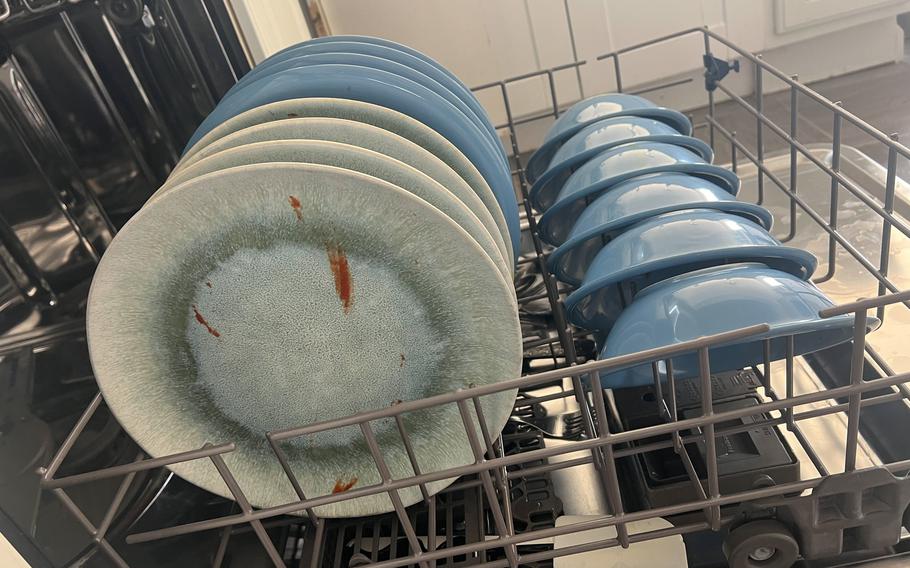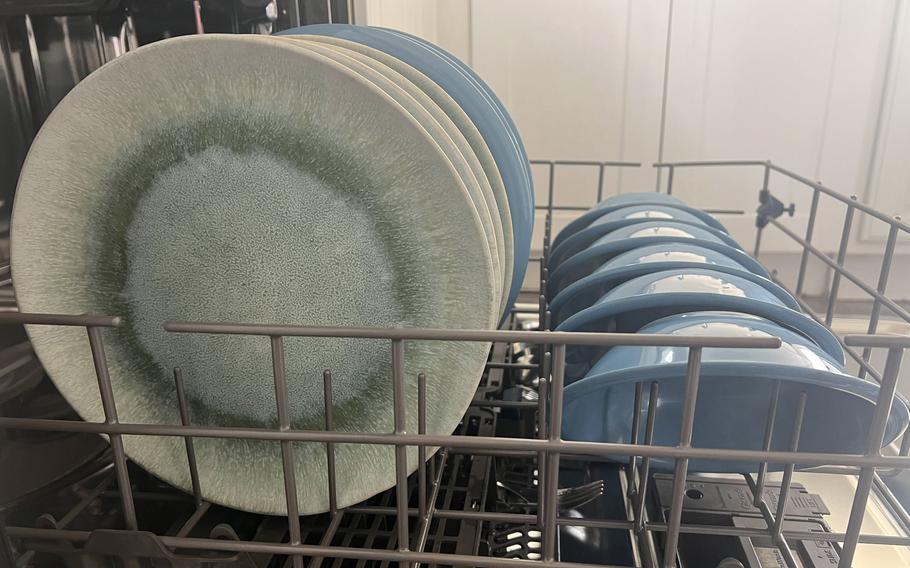
Rachel Kurzius’ rinsed dishes before going through the dishwasher. (Rachel Kurzius/The Washington Post)
There’s all kinds of wisdom, advice and directives surrounding your home. Much of it, we take as gospel: Change your HVAC (heating, ventilation and air conditioning) filter every three months. Clean your gutters at least once a year. Don’t ignore signs of leaks.
But when it comes to washing dishes, the conventional wisdom meets significant resistance.
Experts almost uniformly agree that dishes do not need to be rinsed — and, in fact, should not be rinsed — before going in the dishwasher, saying it wastes water and might make your machine operate less effectively. The Good Housekeeping Institute, which spent more than 374 hours over four months testing 17 dishwasher models loaded with the dirtiest dishes they could conjure, none of them pre-rinsed, confirms this advice.
“For the most part, they do really well,” says Carolyn Forte, the institute’s Home Care & Cleaning Lab executive director.
Despite the rigorous evidence, many of us, myself included, cannot stop rinsing. The suggestion that it’s unnecessary provokes domestic disputes and perhaps disproportionate anger.
“That’s bulls--t!” a colleague shouted when I mentioned that experts say pre-rinsing isn’t necessary.
This fascinating disconnect warranted further study. Through testing and interviews, I found that there are many factors — logistical, psychological, personal, marital — that cloud the issue of dishwashing.
The test
In a small and completely nonscientific test, I asked co-workers to see how our dishes fared with and without rinsing. Two of us were pre-rinsers; two said they don’t rinse, but their spouses do. We used the four dishwasher brands we have at home (Bosch, KitchenAid, GE and Whirlpool) with Cascade Platinum Plus Detergent, which gets high marks from the Good Housekeeping Institute.
We all ran two loads. For the first, we each dirtied eight plates and six bowls with red sauce and egg; eight glasses and four mugs that had been filled with whatever liquids we had around, including coffee, milk and orange juice; and 15-25 pieces of used silverware. We did not rinse and ran a normal cycle. For the second, we repeated the formula, but gave everything a light rinse before running our machines. We evaluated the dishes after each load and also looked at the bottom of the dishwasher, near the drain, for food residue.

Rachel Kurzius’ rinsed dishes after going through dishwasher. (Rachel Kurzius/The Washington Post)
The results
Objectively, the results were slightly mixed and unremarkable.
Tester No. 1 (KitchenAid, with rinse aid) said that there was no difference between the loads. Both were spotless, which tracks with her typical experience.
Tester No. 2 (GE, no rinse aid) ended up with food residue on one of her glasses and a few dirty bowls in the un-rinsed load. This tester suspected that the issue with the bowls may have been because those dishes were not facing the sprayer (further testing confirmed this).
Tester No. 3 (Whirlpool, with rinse aid) spotted a bit of tomato sauce residue in a mug, but otherwise, her dishes were pretty clean after the un-rinsed and rinsed loads.
Tester No. 4 (me, Bosch, with rinse aid) observed a few specks of red sauce here and there, but otherwise didn’t see much difference between the loads.
But the qualitative results of the test proved more interesting.
Tester No. 1 wasn’t impressed with an experiment that confirmed her standard no-rinse practice. But she was pleased to have some evidence to show to her rinsing husband. It’s a bit of a sore spot, she says, because she thinks he wastes a lot of water.
“Every time he rinses off the dishes, I say ‘There’s no need to do that, dear.’ It is a point of contention,” she says. “I get annoyed, but there’s only so much you can do. You can’t change the habits at this point.”
For Tester No. 2, dishwashing is not just about whether the dishes will come out clean; the act of putting un-rinsed dishes into the machine provoked a visceral response.
“Loading the un-rinsed dishes and silverware into the dishwasher was super gross!” she noted in her findings. “The runny eggs and tomato sauce dripped everywhere, getting onto my hands and puddling on the inside of the door.” Touching all of that while she was loading — and the potential for smelliness if the dishes sit for a day or more in her household of two — make not rinsing a nonstarter for her, even after the testing showed she doesn’t really need to rinse.
“A lot of times when we think of the advice for an appliance like that, people are thinking of the classic family of four, where they’re running the dishwasher after every meal, and every meal is a sit-down meal,” says KC Davis, who runs the online mental health site Struggle Care and wrote “How to Keep House While Drowning.” The advice doesn’t take into account small or busy households, she says. If you’re not going to be washing the dishes immediately, Forte suggests running the rinse cycle on your machine (if it has one). It will loosen any tough dirt while still using less water than rinsing everything at the sink.
Tester No. 3 brought some personal history to the experiment. She grew up rinsing the dishes before loading, but after she read that it was unnecessary and that detergent works better when there’s some food for it to adhere to, she changed her approach. Her husband, though, does rinse. So in any given load, some of the dishes have been rinsed, others have not. She plans to continue not rinsing.
“To me, the dishwasher is very much a tool that makes my life easier,” she says. “I would say, like, every other load, there’s a little piece of crud remaining on utensils, and I just put that in the sink and wash it by hand or put it back in the dishwasher for another round, but the overall batting record of the dishwasher is very high, and I have a lot of appreciation for it.”
As for Tester No. 4, I saw the results — yet I’m still pre-rinsing. Why? Why does objectively correct dishwashing advice not impress so many of us?
Expert advice can go sideways in the real world
Cleaning advice has to be filtered through the tools and circumstances of our real lives. The advice to skip pre-rinsing assumes you are using a good detergent and a good machine — and that you’re using the machine correctly.
That starts with your reading your manual (hahaha) to make sure you’re using the right setting. “Normal,” a frequent go-to cycle, has evolved into more of a light wash setting as dishwashers have become more energy efficient, Forte says. It’s often best to use the “Auto” cycle, which senses how dirty the dishes are and adjusts accordingly (and in this case, she adds, pre-rinsing can work against you because the machine will sense that there’s not much dirt and not work as hard).
The filter also needs to be checked and cleaned regularly, and you should use a dishwasher cleaner monthly to dissolve mineral buildup and flush the system. Plus how you load (or overload) your machine and where dishes are placed can affect the results, as Tester No. 2 found.
In addition to these logistics, we bring unquantifiable baggage to the question of rinsing dishes.
“It’s been passed down,” Forte says. “Dishwashers were one of the last appliances that people really embraced.” That’s because you could easily wash your dishes by hand, and it perhaps seemed inconceivable that a dishwasher could get them really clean. Previous generations came to see dishwashers more as sanitizers than actual cleaners. Newer models use much less water than older units (about three to four gallons for an Energy Star-rated appliance), making it even more difficult to believe that they can get the job done.
Davis suggests our obsession with rinsing may be rooted in our childhood memories. Many adults are young enough that they had a dishwasher growing up, but those models didn’t have the elbow grease to do the heavy cleaning, so you did need to pre-rinse, she says. Kids being kids, though, they would look for shortcuts in their chores and perhaps skip the rinsing, only to have their parents yell at them.
“A lot of us have this core memory of it being a fight or a struggle in our house,” she says.
Many people also carry baggage around cleanliness, Davis adds, seeing it as a reflection of their character. Good, upstanding adults, after all, keep a clean house. Or at least, that’s what we’re conditioned to think. So not rinsing still feels like taking the easy way out and carries the weight of guilt. “If it’s too convenient we almost feel like we’re not doing it right.”
I know in my head that rinsing wastes water — an increasingly precious commodity — and time. This test proved that un-rinsed dishes come out largely clean in my machine. The factors that can keep that from happening are entirely in my control. But we hand-washed dishes when I was a kid until we moved to a home with a dishwasher when I was in high school. That machine (and my mom) demanded that I rinse. While it wasn’t a source of conflict, it did become routine, and old habits are hard to break.
And loading dirty plates just doesn’t track in my head — if I struggle to scrub off dried mac and cheese or oatmeal, how can a dishwasher knock it loose? Also, sometimes I don’t get perfect results (likely because of a dirty filter or an overloaded machine, Forte suggests). It’s easier to rinse stuff off before I run the cycle than deal with the hardened residue after it’s gone through a cycle.
My non-rinsing colleague points out that if one or two items come out with a bit of crud on them, it’s not that hard to hand-wash them in the sink or let them run through another cycle. She’s not wrong. But that’s her, and I am me. We each bring our own history and personality and germ tolerance to the sink every time we run a load of dishes.
To the pre-rinse holdouts, including myself, I say it’s worth trying to shake this habit. The environmental stakes are too high. But go easy on yourself if you end up rinsing spaghetti sauce off your plates out of habit, or if you absolutely must rinse those eggy forks before you touch the prongs during loading. And no one really expects you to read that manual.